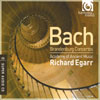Bach Brandenburg Concertos
Alluring and vexatious Brandenburgs – but which worthwhile ones aren’t?
View record and artist detailsRecord and Artist Details
Composer or Director: Johann Sebastian Bach
Genre:
Orchestral
Label: Harmonia Mundi
Magazine Review Date: 6/2009
Media Format: Super Audio CD
Media Runtime: 0
Mastering:
Stereo
DDD
Catalogue Number: HMU80 7461/2

Tracks:
| Composition | Artist Credit |
|---|---|
| (6) Brandenburg Concertos |
Johann Sebastian Bach, Composer
Academy of Ancient Music Johann Sebastian Bach, Composer Richard Egarr, Harpsichord |
Author: Lindsay Kemp
Interestingly, Egarr’s booklet-note pays tribute not to the pioneering period recordings of these works by Leonhardt (RCA, 8/81), Harnoncourt (Teldec, 3/67R) or Pinnock (Archiv, 1/84R), but to those of earlier vintage by Cortot (EMI) and Casals (Columbia), and it is noticeable that these performances have moved away from the clipped articulative gestures of recent decades to embrace something of the older tradition of shapely long lines and smooth phrases. It gives the music an easy feel, relaxed and friendly as befits its chamber status, though the downside is an absence of the clarity and brightness one expects from a small band, exacerbated perhaps by the choice of a recording environment more often used to lend its bloom to choral sound (St Jude’s, Hampstead), the addition of a texture-clouding theorbo, and an authentically low pitch of A=392. In short, there is often a frustrating murkiness here, enough to give cause for reservation.
But of course there are good things aplenty: it is lovely to hear the oboes really lean on their suspended dissonances in the last movement of No 1; the first of No 4 has a surprising yearning quality at its speed, the last a feeling for line combined with a spritely tempo; there is a joyful rustic swing in the finale of No 5; and No 6 has suave definition in its first movement before revealing all its beauty in the second (was there ever a finer moment for violas than this?). These Brandenburgs, then, can be both alluring and vexatious. But then, show me worthwhile ones that aren’t.
Discover the world's largest classical music catalogue with Presto Music.

Gramophone Digital Club
- Digital Edition
- Digital Archive
- Reviews Database
- Full website access
From £8.75 / month
Subscribe
Gramophone Full Club
- Print Edition
- Digital Edition
- Digital Archive
- Reviews Database
- Full website access
From £11.00 / month
Subscribe
If you are a library, university or other organisation that would be interested in an institutional subscription to Gramophone please click here for further information.




